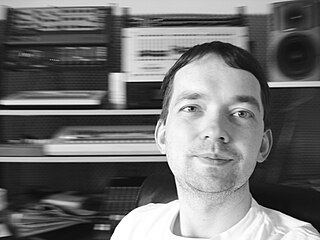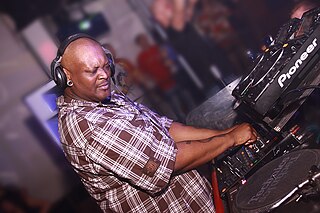Related Research Articles

A rave is a dance party at a warehouse, club, or other public or private venue, typically featuring performances by DJs playing electronic dance music. The style is most associated with the early 1990s dance music scene when DJs played at illegal events in musical styles dominated by electronic dance music from a wide range of sub-genres, including drum and bass, dubstep, trap, break, happy hardcore, trance, techno, hardcore, house, and alternative dance. Occasionally live musicians have been known to perform at raves, in addition to other types of performance artists such as go-go dancers and fire dancers. The music is amplified with a large, powerful sound reinforcement system, typically with large subwoofers to produce a deep bass sound. The music is often accompanied by laser light shows, projected coloured images, visual effects and fog machines.

Tresor is a techno nightclub in Berlin and a record label.

Warp Records is a British independent record label founded in Sheffield in 1989 by record store employees Steve Beckett and Rob Mitchell and record producer Robert Gordon. It is currently based in London.

4hero are an electronic music group from Dollis Hill, London, comprising producers Mark "Marc Mac" Clair & Denis "Dego" McFarlane. 4hero are known for being pioneers of breakbeat hardcore, jungle/drum and bass, broken beat and nu jazz music.

Alexander Kowalski is a German techno music artist.

Pacou is a German techno music producer. He has released albums and EPs on his own label, LL Records, as well as on the Berlin-based Tresor label, Djax-Up-Beats, Konsequent, and Music Man Records. He records under the monikers Pacou and Agent Cooper.
Jane Rolink, known by her stage name Mrs Wood, is a British DJ and record producer.

"Sesame's Treet" is a 1992 single by the English rave group Smart E's. It is a remix of "Can You Tell Me How to Get to Sesame Street?", with the song's title being a pun on "Sesame Street". The song reached No. 2 on the UK Singles Chart in July 1992 and peaked within the top 10 in Australia, Ireland, and New Zealand. In the United States, it reached No. 60 on the Billboard Hot 100 chart and topped the Billboard Maxi-Singles Sales ranking.
Blake Baxter is an American techno musician, associated with the first wave of Detroit techno. AllMusic called him "perhaps the most underrated figure" of the early Detroit techno scene.
Eddie Fowlkes is an American techno and house DJ. He was influential to the early Detroit techno scene.

Stewart Walker is an American electronic music record producer, who lives and works in Berlin. Walker's forté is live performance, a rarity in the world of beat-driven electronic music, and he is known for contributing to the development of minimal techno with his 1999 album Stabiles.
Techno is a genre of electronic dance music which is generally produced for use in a continuous DJ set, with tempos being in the range from 120 to 150 beats per minute (BPM). The central rhythm is typically in common time (4/4) and often characterized by a repetitive four on the floor beat. Artists may use electronic instruments such as drum machines, sequencers, and synthesizers, as well as digital audio workstations. Drum machines from the 1980s such as Roland's TR-808 and TR-909 are highly prized, and software emulations of such retro instruments are popular.
New beat is a Belgian electronic dance music genre that fuses elements of new wave, hi-NRG, EBM and hip hop. It flourished in Western Europe during the late-1980s.

Slave to the Game is the fifth studio album by American metalcore band Emmure, released on April 10, 2012, through Victory Records. The record was produced by Joey Sturgis, who also did production on the band's previous album Speaker of the Dead. It is the first album to feature drummer Mark Castillo, following the band parting ways with their former drummer Mike Kaabe in October 2011.

Bag of Bones is the ninth studio album by the Swedish rock band Europe. It was released on 18 April 2012 in Japan by Victor Entertainment and on April 25 in Sweden by Gain Music Entertainment. Bag of Bones is the first Europe album to chart in UK Top 100 Albums since Prisoners in Paradise in 1991 and also entered in UK Top 40 Rock Albums at number 3.

Isaiah Major best known as DJ Rush, is an American musician, DJ and record producer of electronic music, who was active in the early Chicago House scene.
"(Ain't That) a Lot of Love" is a 1966 song written by Homer Banks and Willia Dean Parker, and first released by Banks on Minit Records, titled "A Lot of Love".

Halocyan Records is an American independent record label founded in 2010 by Dimitri Fergadis, the founder of experimental techno label Phthalo Records. Based in Los Angeles, California, the label has released music by DJ Pierre of Chicago-based acid house group Phuture, Paul Woolford, techno pioneer Joey Beltram, Vladislav Delay, ASC, xxxy, Appleblim & Al Tourettes, Extrawelt.
"Dominator" is a song by the Dutch electronic music group Human Resource. It is the group's debut single released in 1991 which later appeared on their full-length album Dominating the World. The single reached No. 36 on the UK singles chart and No. 6 on both the Dutch Single Top 100 and Belgian Ultratop 50 charts.
Belgian hardcore techno is an early style of hardcore techno that emerged from new beat as EBM and techno influences became more prevalent in this genre. This particular style has been described as an "apocalyptic, almost Wagnerian, bombastic techno", due to its use of dramatic orchestral stabs and menacing synth tones that set it apart from earlier forms of electronic dance music. It flourished in Belgium and influenced the sound of early hardcore from Netherlands, Germany, Italy, UK and North America during the early-1990s, as a part of the rave movement during that period.
References
- ↑ "Joey Beltram Songs, Albums, Reviews, Bio & Mor..." AllMusic. Retrieved November 6, 2024.
- ↑ "Joey Beltram". Awakenings. Retrieved 2023-12-20.
- ↑ "Rhythm Device : Acid Rock". Discogs.com. Retrieved November 6, 2024.
- ↑ "The Project : Do That Dance". Discogs.com. Retrieved November 6, 2024.
- 1 2 Colin Larkin, ed. (2000). The Virgin Encyclopedia of Nineties Music (First ed.). Virgin Books. pp. 40/1. ISBN 0-7535-0427-8.
- ↑ "Joey Beltra". Discogs.com. Retrieved November 6, 2024.
- ↑ "Pleasure Game". Discogs.com. Retrieved November 6, 2024.
- ↑ "None". Discogs.com. Retrieved November 6, 2024.
- 1 2 "Friends of Django Fuckin Revenge". Discogs.com. Retrieved November 6, 2024.
- 1 2 "Vitamin The Point". Discogs.com. Retrieved November 6, 2024.
- ↑ "Joey Beltram". Awakenings.com. Retrieved November 6, 2024.
- ↑ Reynolds, Simon (1999). Generation Ecstasy. Routledge. ISBN 9780415923736 . Retrieved 3 May 2011.
- ↑ "Tour dates: Joey Beltram". Residentadvisor.net. Retrieved 3 May 2011.
- ↑ "JB³, Close Grind". Discogs.com. Retrieved 3 May 2011.
- ↑ "STX Records". Discogs.com. Retrieved 3 May 2011.
- ↑ Chart statistics of "Caliber EP", Officialcharts.com; retrieved January 20, 2019